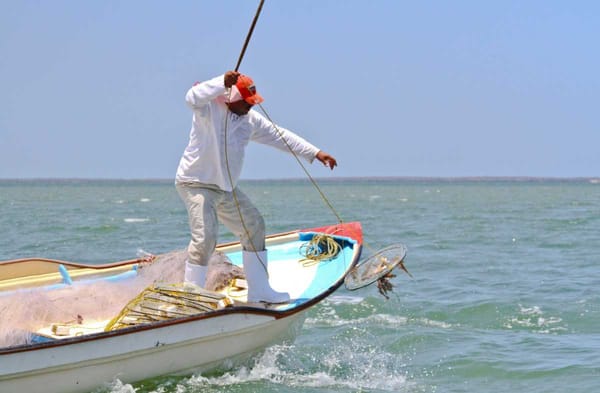World's food security at risk from pressure on rivers
Fresh analysis reveals that the production of 25% of all food depends on river water irrigation.

The UN Food Systems Summit will take place and just before it begins, an analysis by WWF was released that found that one-third of the world's food production depends on the world's increasingly threatened rivers. This represents an imminent risk to food security and the ability to sustainably supply 10 billion people by 2050.
The study describes how these water sources support four key components of global food production: irrigation, freshwater fisheries, deltas, and floodplain agriculture, and how the entire system is increasingly at risk from the ongoing degradation of the world's rivers.
"Rivers are critical to feeding the world, but protecting and restoring their health and resilience are not even on the periphery of global food systems discussions," said Stuart Orr, WWF's Global Freshwater Leader.
"Rivers have nourished us since the dawn of civilization, helping to feed billions of people from indigenous communities to megacities. But river systems are under increasing stress and if we don't take urgent action to better manage them, we will not be able to sustainably provide for everyone on Earth," added Jeff Opperman, WWF's Global Freshwater Lead Scientist and co-author of the study.
The name of the report is "Rivers of Food" and the data it contains shows that much more food depends directly on rivers than previously thought:
Irrigation: about 25 % of the world's food comes from farmland irrigated by their waters.
Freshwater fisheries: 40% of the world's fish consumption is river-based, including one-fifth of the world's fish catch and more than two-thirds of aquaculture fish.
Deltas: river sediment creates and sustains deltas, which produce 4% of the world's food on just 0.5% of its land, and are home to around 500 million people.
Agriculture on river land covers at least 10 million hectares, mostly in Asia and Africa, which is equivalent to the arable land in Italy and produces about 1 % of the world's food.
"Rivers are the arteries of the planet, flowing with water, sediment, and nutrients that support a third of the world's food production, but, ironically, our agricultural practices are one of the biggest threats to rivers and the food products they support," said Joao Campari, WWF's Global Food Leader.
According to WWF, agriculture alone accounts for more than 70% of all freshwater used by people, while it is also the largest polluter of rivers and freshwater ecosystems, and a major contributor to greenhouse gas emissions, deforestation, and biodiversity loss. In addition, 75% of irrigated crops are grown in water-stressed areas, figures that will only get worse as the world warms up.
On the other hand, according to the organization, only one-third of large rivers flow freely, even though they are fundamental for the stability of deltas and the survival of freshwater fisheries.
"The clearest sign of the damage we have caused, and continue to cause to our rivers, is the collapse of freshwater biodiversity. In the last 50 years, we have lost 84% of our freshwater species populations, far more than in terrestrial or marine ecosystems. Food systems are responsible for 50% of this biodiversity loss," reports WWF.
Later this week, the UN Food Systems Summit is expected to announce actions, solutions, and strategies to transform the global food system. These actions should strengthen the resilience of river systems, ensure that natural fisheries and aquaculture are sustainable, maintain the free flow of rivers and promote the adoption of healthy diets, among other measures to protect and restore rivers.
The "Rivers of Food" analysis is available on this website.
Source: El Espectador




